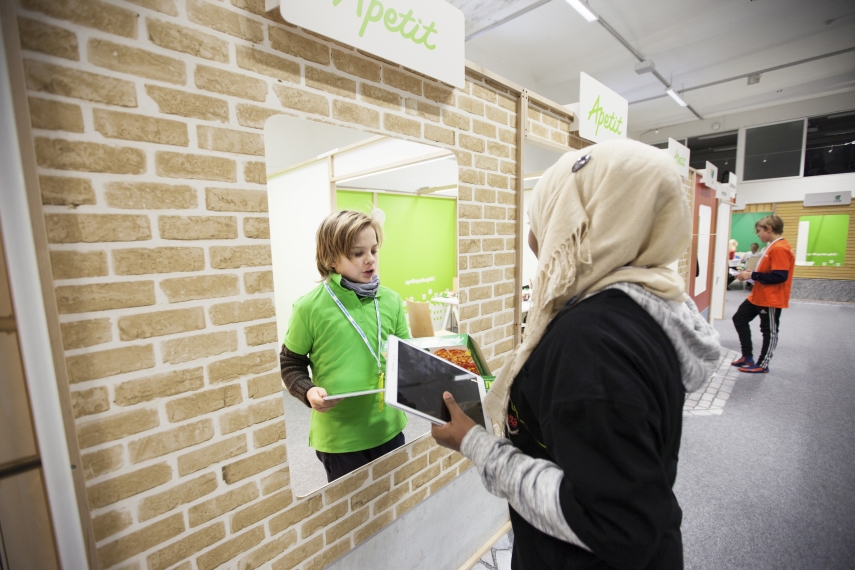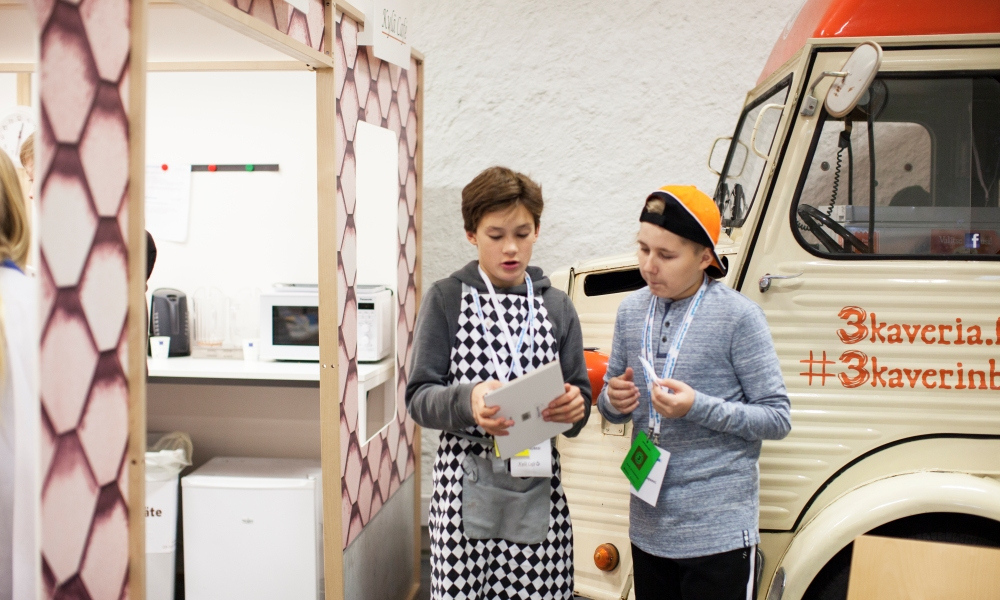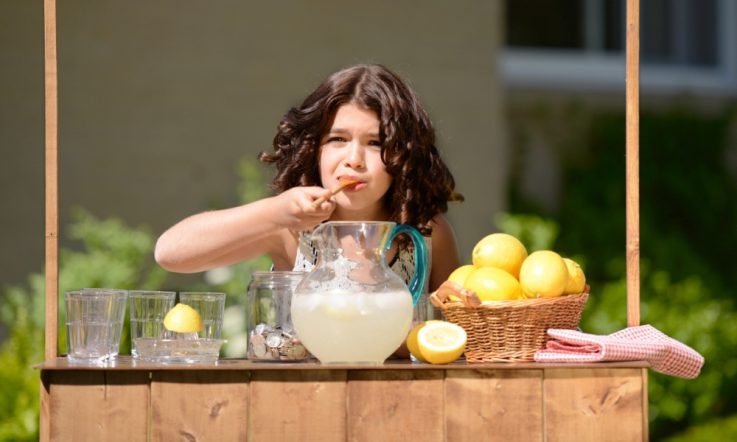Hello, thank you for downloading this podcast from Teacher magazine – I'm Jo Earp.
For this episode of Global Education we visit Finland. Operating across eight locations, the award-winning Me & MyCity 6th Grade program includes teacher training and learning resources for 10 lessons, followed by a visit to a miniature city where students work in their chosen profession and learn more about being a consumer and citizen, including banking, voting ... and spending their hard-earned salary! Tiina-Maija Toivola, Chief Operating Officer of Me & MyCity, joined me on the line from Helsinki. I started by asking why entrepreneurship education is important in school settings.
Tiina-Maija Toivola: Actually, in Finnish teacher education there has not been a lot of training about economy or financial issues or society in general. So, how we see entrepreneurship education is to provide the kids with a mindset to find the entrepreneurial spirit, to find the self-confidence for working life and to be a citizen in society.
Jo Earp: You're Chief Operating Officer of the Me & MyCity learning program there in Finland. How does it work exactly?
TT: We operate in eight locations in Finland right now and we have these miniature societies, miniature cities for 6th Graders (they're 12- and 13-year-olds). So, they start with 10 lessons in the classroom with their own teachers about society, about the economy, about taxation, why do we have banks, things like this, to orientate for the day in Me & MyCity. And also during the lessons they apply for a job – they actually get a list of different jobs they have in their own Me & MyCity, they apply for the job and then they go to work in their own profession for one day. Of course, it's not only about working, it's also about free time, and about being a citizen and consumer. So actually during their free time they vote, they can go shopping, make decisions about how they spend their salary.
JE: And, is there some sort of preparation that you do with the teachers? Do they have a training pack? What happens before they do those 10 lessons?
TT: Yes, we start with the teacher training. So, basically, for example in the metropolitan area here in Helsinki [and all the big cities] we have trained all the teachers that have a 6th Grade class. The reason why we train them is of course because of the practical issues, but also because the teacher training doesn't have a lot of substance about financial literacy, economy, society – things like this. We actually have four hours training for the teachers and provide them also with the support for the learning materials.
JE: I was having a read about some of the things the teacher does on the actual day, so you mentioned the kids go there and they can choose a profession – it's like a little self-contained learning environment isn't it really. There's about 70 or so professions, I read, and the teacher is sort of the employer? They have to apply for the job.
TT: Exactly. So, all the kids they have possibilities to apply for three different jobs in Me & MyCity and in each Me & MyCity the jobs are a little bit different to each other. For example, in northern parts of Finland there's a lot of technology industry or, say, food industry – different kinds of industries in different regions. So, they also see the companies they recognise from their everyday life. However, we have all kinds of professions, from Mayor to process engineer, to sales manager. The kids have the chance to write an application and actually we provide the teachers with the information about the, if I can call them, ‘qualifications' that are needed in each profession. So, say if we have a kid that is social, really has the ability to get along with different kinds of people, we can say ‘okay, sales manager could be a good position for them'. We can actually strengthen or support the kids in what they are best at.

[Students can apply for three different jobs in the Me & MyCity program. Image supplied: Me & MyCity]
JE: I think this program has been running for about seven years, you're quite a way into it. What has been the impact of it so far on teachers and students, and of course the local communities around there?
TT: It's a good question – I actually call it the ‘generation experience'. Here in Helsinki for example, what I've heard from the teachers, is that the kids already on 6th Grade tell the 5th Graders what are the best jobs to apply for or what they enjoyed the most. So, actually the 5th Graders are already looking forward to going to Me & MyCity. … at first a lot of teachers were a little bit critical or sceptical about it when they didn't know what it was about. But now we can also see the teachers are our best promoters, the true believers, they really enjoy coming back to Me & MyCity. We also work with universities here in Finland to see the long-term impact. For example, a professor from the University of Vaasa did research on the financial literacy that increases during the study module. And of course we hope we can see more long-term impact about career choices or things like this in the future.
JE: Yes, I guess those long-term impacts you've got to wait for that to take its course. We know that schools definitely benefit from links with outside organisations, to bring in expertise. Have you found that schools develop links with the local businesses? Has this been one of the knock-on effects?
TT: Yeah, for sure. First of all, the teacher and the kids of course get to know the businesses they have around them and also a picture of what kinds of organisations we have in society and what they do. But also a lot of classes, I know they contacted the companies after their visit and went for an actual visit to the site of the company. Also, the companies we work with provide extra lessons. So, the banks might offer financial literacy classes or the energy company we work with might go to the classrooms to talk about energy, things like this. So, there's actually a long-term impact in that sense too.
JE: Sounds great. I read that to date, in those seven years, more than 150 000 students and 5000 teachers have taken part in the program in Finland. Have you had interest from other education systems in other countries?
TT: Yes, a lot really! Actually, in 2013 we got an award from the European Commission for promoting entrepreneurial spirit and the year after we were awarded in Doha a [WISE award] for the World Innovation Summit for Education. After that we've had a lot of contact from all over the world. What we do right now, we work on a non-profit basis, so actually the mission of our organisation is to provide the program in Finland. But we're currently also working with the city of Stockholm in Sweden to see whether we have the chance to pilot the program there. … we have to see how it works in different cultures and there's a lot to develop in the learning concept in that sense, but I'm sure there's a need for this kind of program in a lot of places in the whole world. Probably in the upcoming years, we'll see whether we can actually do it outside Finland.
JE: What you've said so far, mentioning the businesses, and even within Finland the different types of things that you do on the day, it's obviously got to fit the local context. What about next steps in terms of Finland then – are you looking to expand to different age groups for example?
TT: Yeah, that's really a good question. The first thing is now we reach 70 per cent of the age group (6th Graders) – that's a lot and we always wanted to reach 100 per cent, so that's probably one of the next steps we want to take. Besides that, we actually introduced a new model for 9th Graders about a year ago and we're having the pilot phase in three cities right now. It's been a success, it's really great it's like I said for 9th Graders and it's more about global economy. They work as executive teams for global companies and they compete in global markets. So, it's more exciting, the digital side is more developed. But, that's something that we want to expand in Finland. Now we work in eight locations for 6th Graders and we want to expand the model for 9th Graders model to eight locations too.
JE: It sounds like something we should be doing a follow-up with you on! Thank you very much for sharing the story of Me & MyCity today with Teacher magazine. Like I say, it would be great to catch up with you again in the future and we wish you every success.
You've been listening to a podcast from Teacher magazine. To keep listening or to download all of our podcasts for free, visit acer.ac/teacheritunes or www.soundcloud.com/teacher-ACER. To access our articles, videos and infographics visit www.teachermagazine.com.au.
How are you supporting students to develop their financial literacy skills?
Are your students aware of the range of professions and career opportunities that exist in their local community and beyond?
In what ways could your school work collaboratively with local businesses to improve student learning outcomes?



